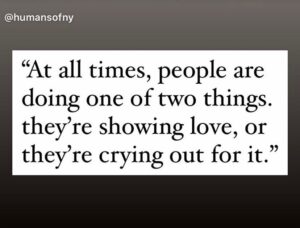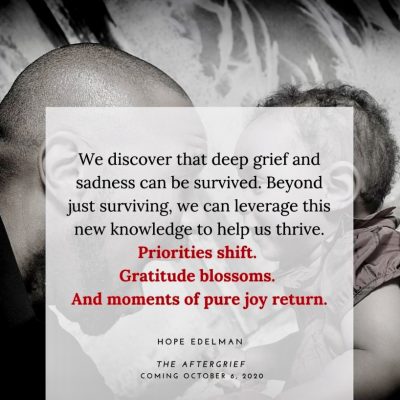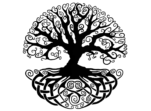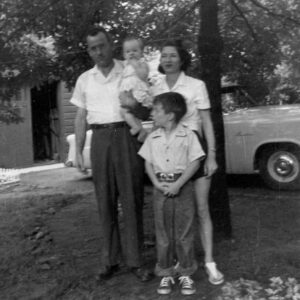It's time to tell ourselves a new story.
Today’s is the last in a series of posts based on Hope Edelman‘s upcoming book, The AfterGrief. In her recent conversation with Rebecca Soffer, they discussed the need for “reframing” the stories we tell ourselves.
Especially for those of us who experienced early loss, it’s easy to feel as though we never grieved appropriately, and we often carry that sense of having done something inadequately–or worse yet, wrong–into adulthood.
It was hard to forgive myself for failing a test I could never retake.
In my case, the regrets went back to before my mother died. During that year, after my father had passed, we moved–my mother, my brother, and me–yet again. Another new town meant, of course, yet another new school and a new group of classmates and neighborhood kids to win over.
I pasted on a smile and forged ahead. Those who didn’t know would never have suspected that my father had just died and my mom was seriously ill. Who’d want to be friends with the sad girl?
I was not as lovely at home. There are memories I spent years fighting to forget, of my slamming doors and complaining about not being able to have sleepovers, about the lack of the family life at our house that I saw at my friends’ homes. As if my mother had any control. As if she wouldn’t have changed it all if she could.
As I passed through my teens and into adulthood, I couldn’t believe I had been so cruel. One day during a visit with my mother’s best friend, El, I revealed what I’d been holding onto like a volatile bomb inside me.
“Why didn’t anyone tell me she was going to die?” I asked, though I knew from previous conversations that my mother had insisted my life not be colored by the threat of her leaving.
“I was so mean to her that last year,” I continued, “such a brat. I would have been so much kinder.”
El, infinitely wise, absolved me with a single line.
“Casey, you were 12.”
I didn't get to grieve my parents' deaths when I was 12, and here's the truth about that: It was Not. My. Fault.
In 1967, there was no talk of grief counseling, of the importance of my having someone to talk to, even if it were family members or others who cared for me.
That wasn’t my fault, and in many ways, it wasn’t theirs, either. No one in my circle of support had the slightest idea what to do for a child who was grieving the loss of the family and the life she’d known, left to navigate a new reality.
It’s not that I wasn’t allowed to speak of my parents. I was. But when I did, I was perceptive enough to know that the adults had no idea what to say or, worse yet, became upset. I had no desire to make someone any sadder than they already were. Than I already was.
It wouldn’t be until a few years later, when I reconnected with El, that I was able to speak freely about the family I remembered and the life I’d left behind.
So, though I cried myself to sleep in my room at night, during the day I pasted that smile back on my face and moved on. In this family where a culture of silence dictated a lack of speaking aloud about anything personal or difficult, it seemed the best approach.
Extending compassion to the girl I'd been became the first step in healing.
I’d be a mother myself before I’d begin to reclaim my own identity as my mother’s daughter and reconnect to the child she left behind. I began to think of the things I’d want to offer a girl who was going through the same sorts of upheaval and loss I knew back then.
If I believed–as I did and still do–that all behavior is rooted either in extending love or a cry for love, then I understood that I could do both. I could be at once the lost child and the comforting mother, the compassionate friend and the bereaved girl in need of that compassion.
With that in mind, I learned to create space for that 12 year old who’d had her life turned upside down, who hoped the worst was over now, that life would make sense from here on out. I helped her see herself as a strong, resilient girl who’d been determined to do hard things in the face of many obstacles. Who’d been determined to survive.
Reestablishing a loving relationship with the child I was and forgiving her for the mistakes she made—through no fault of her own, but because she was dependent on others around her for guidance and compassion—was a key step in the journey to rewriting my story.
With age also came the ability to identify with my mother and see things from her perspective. Thinking of my own kids, I understood she’d known how much I loved her, despite the acting out of preadolescence. I saw that our connection had not been damaged and that the love lives on.

Who among us hasn’t experienced a life-changing loss?
If it’s not death of a loved one that shakes us, the tragic passing of a celebrity we felt especially connected to, a difficult breakup, even the ending of a significant friendship can make us question the things we thought we understood about about life and our place in the world.
When those fractures happened before we were old enough to process the loss and understand how to live on without these people we’ve seen as integral to our lives and our own identities, reframing the story we’ve held onto, sometimes for decades, can open the door to a new level of healing and ultimately to welcome post-traumatic growth.
What story do you tell yourself about losses that have shaped you?
Who would you be if you learned to see things differently?





It’s unimaginable what kids went through in our era without counseling or even recognition of the destruction of unprocessed grief. Thank goodness you had that straightforward message from El to put it into perspective. You are a true survivor, Casey. And the pics are a great touch!
Thanks, Karen. Yes, the 60s were really the dark ages of emotional support, and think of how little processing those in charge of raising us had done in their own childhoods. It’s a wonder we all made it through as intact as we did…a tribute to intrinsic resilience!
I love how you worked your later learning to heal your younger self, how you were able to communicate that to us, your readers. You embraced that awareness and are now sharing that knowledge so others can pick up that practice and apply it in their own lives. I feel blessed to know you.
We each have a story about our lives, don’t we? The way we’ve come to frame what happened to us, and it can either propel us along our journey or hold us back. None of us is really there yet! Though this is a story I’ve worked to change for decades, because that shift doesn’t happen all at once, there are new events, new stories all the time. It’s a full-time job :-).
Once again-I just didn’t know. Thank you for sharing your story. You have come out whole, happy and strong. And yes. We all have our stories. Yours has given me a nudge to keep writing the memoir I have worked on for years.
If my story has inspired you to keep going with yours, my work here is done. Thanks so much fir reading, Irene. Hope to see you again soon.